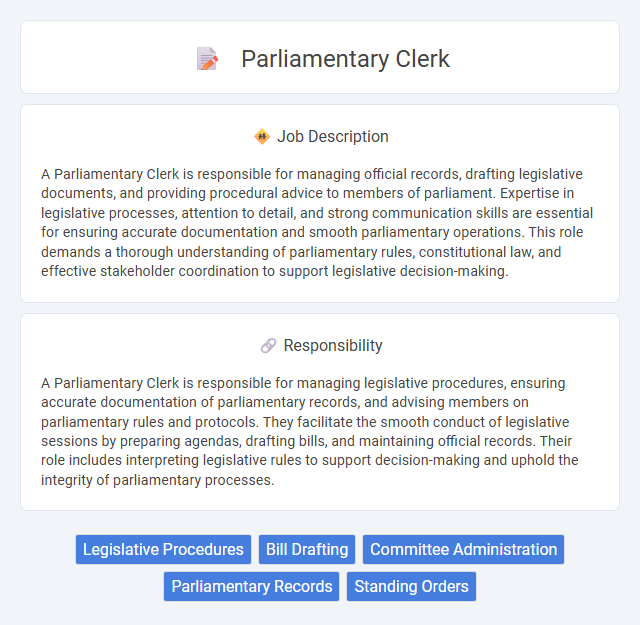
A Parliamentary Clerk is responsible for managing official records, drafting legislative documents, and providing procedural advice to members of parliament. Expertise in legislative processes, attention to detail, and strong communication skills are essential for ensuring accurate documentation and smooth parliamentary operations. This role demands a thorough understanding of parliamentary rules, constitutional law, and effective stakeholder coordination to support legislative decision-making.
Parliamentary Clerk roles likely suit individuals who demonstrate strong attention to detail, excellent organizational skills, and the ability to work under pressure in formal settings. Those with an interest in legislative processes, a calm demeanor, and effective communication abilities may find this job particularly fitting. Candidates less comfortable with complex legal language or high-stakes environments might find the role challenging.
Qualification
A Parliamentary Clerk typically requires a strong educational background in law, political science, or public administration, often holding a bachelor's or master's degree. Expertise in legislative procedures, legal drafting, and governmental regulations is essential for accurately advising members of parliament and ensuring compliance with parliamentary rules. Strong analytical skills and experience in research and documentation support effective management of legislative processes and procedural guidance.
Responsibility
A Parliamentary Clerk is responsible for managing legislative procedures, ensuring accurate documentation of parliamentary records, and advising members on parliamentary rules and protocols. They facilitate the smooth conduct of legislative sessions by preparing agendas, drafting bills, and maintaining official records. Their role includes interpreting legislative rules to support decision-making and uphold the integrity of parliamentary processes.
Benefit
A Parliamentary Clerk likely benefits from a unique exposure to legislative processes, gaining intricate knowledge of parliamentary procedures and legal frameworks. The role might also offer opportunities for professional development, such as training in legal drafting and public administration. Strong job stability and the potential for a collaborative work environment could add further appeal to this career path.
Challenge
Facing the role of a Parliamentary Clerk likely involves managing complex legislative procedures and ensuring precise documentation under tight deadlines. The challenge probably lies in balancing intricate legal requirements with efficient communication across diverse parliamentary members. Mastery of detailed protocol and adaptability to fast-paced changes may strongly influence success in this position.
Career Advancement
A Parliamentary Clerk plays a crucial role in facilitating legislative processes and ensuring the accuracy of parliamentary records, creating a strong foundation for career growth in government and public administration sectors. Expertise in legislative procedures, legal research, and effective communication opens pathways to senior advisory roles, policy development positions, and parliamentary committee leadership. Continuous professional development and deep understanding of parliamentary protocols enhance prospects for advancement to higher-ranking roles within legislative bodies and government institutions.
Key Terms
Legislative Procedures
A Parliamentary Clerk specializes in guiding legislative procedures by ensuring accurate interpretation and application of parliamentary rules and protocols. They meticulously prepare official documents, manage legislative records, and facilitate orderly debate and decision-making processes within parliamentary sessions. Their expertise supports the smooth enactment of laws and maintains the integrity of legislative operations.
Bill Drafting
A Parliamentary Clerk specializing in Bill Drafting plays a crucial role in translating legislative intent into clear, precise legal language within proposed bills. This position requires a deep understanding of parliamentary procedures, statutory interpretation, and legislative frameworks to ensure the accuracy and coherence of draft legislation. Expertise in drafting facilitates effective law-making by minimizing ambiguities and aligning the bill's provisions with existing laws and policies.
Committee Administration
A Parliamentary Clerk specializing in Committee Administration manages the procedural and operational functions of parliamentary committees, ensuring accurate record-keeping and facilitating efficient meeting workflows. They prepare agendas, draft minutes, and coordinate communication between members, supporting informed decision-making and compliance with legislative rules. Expertise in legislative processes and strong organizational skills are essential to maintain transparency and uphold parliamentary standards.
Parliamentary Records
A Parliamentary Clerk plays a crucial role in maintaining accurate and comprehensive parliamentary records, ensuring the integrity of legislative documentation. They manage the preparation, preservation, and accessibility of official transcripts, votes, and procedural records to support transparent governance. Expertise in legislative processes and attention to detail are essential for safeguarding the historical and legal accuracy of parliamentary archives.
Standing Orders
The Parliamentary Clerk plays a crucial role in managing and interpreting Standing Orders, which govern the procedures and rules of parliamentary sessions. They ensure accurate application of these regulations to facilitate orderly debates, motions, and voting processes. Expertise in Standing Orders enables the clerk to advise members on procedural matters and maintain legislative integrity.
 kuljobs.com
kuljobs.com